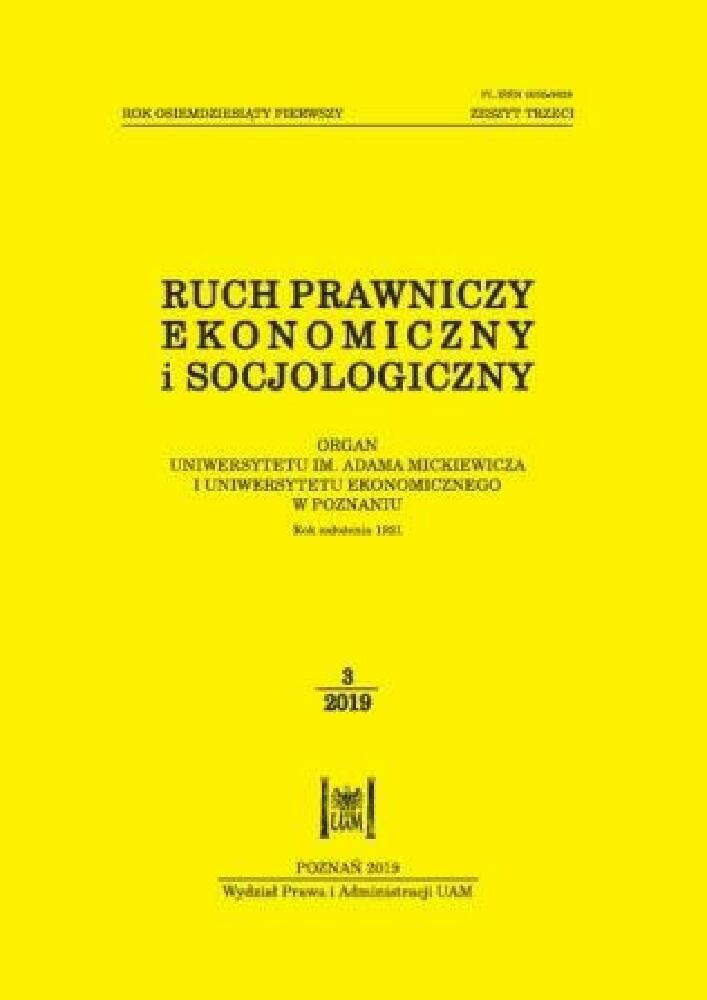Abstract
The aim of this article is to conduct an analysis of non-tax revenue from fines and tickets in Polish local governments and to verify hypotheses covering their real causes. On the basis of a created dataset of revenues from tickets in the relevant budget divisions of 2,474 counties in Poland in the 2007–2017 period, the diversity of revenues from tickets in Polish counties was examined. Data analysis indicates that there is a group of counties in Poland where tickets and fines became the instrument of budgetary policy and a way to generate significant non-tax revenue. The results of econometric model estimation confirm a dependency between revenue from tickets and crime, the macroeconomic situation and expenditures on municipal police. A fall of revenues from tickets before local elections was not observed.References
Baicker, K., Jacobson, M. (2007). Finders keepers: forfeiture laws, policing incentives, and local budgets. Journal of Public Economics 91(11/12): 2113–2136.
Bracco, E. (2018). A fine collection: the political budget cycle of traffic enforcement. Economics Letters 164(1): 117–120.
Felis, P. (2010). Główne źródła dochodów budżetowych w Polsce. Studia BAS 23(3): 91–114.
Filipiak, B. (2016). Podatkowe czynniki kształtujące potencjał finansowy jednostek samorządu terytorialnego. Finanse, Rynki Finansowe, Ubezpieczenia 79(1): 643–653.
Garett, T., Wagner, G. (2006). Are traffic tickets countercyclical? SSRN Electronic Journal 48A.
Garett T., Wagner, G. (2009). Red ink in the rearview mirror: local fiscal conditions and the issuance of traffic tickets. The Journal of Law and Economics 52(1): 71–90.
Guillamon, D., Bastida, F. (2013). The electoral budget cycle on municipal police expenditure. European Journal of Law and Economics 36(3): 447–469.
Hummel, D. (2015). Traffic tickets: public safety concerns or budget building tools. Administration and Society 47(3): 298–319.
Makovsky, M., Stratmann, T. (2009). Political economy at any speed: what determines traffic citations. American Economic Review 99(1): 509–527.
Najwyższa Izba Kontroli (2013). Prawidłowość realizacji zadań przez Straże Miejskie (Gminne) w zakresie wykorzystania urządzeń do pomiaru i rejestracji wykroczeń drogowych. KPB-4113-01-00/2013. Warszawa.
Quintanar, S. (2017). Man vs. machine: an investigation of speeding ticket disparities based on gender and race. Journal of Applied Economics 20(1): 1–28.
Rosenberg, J. (1990). Rationality and the political business cycle: the case of local government. Public Choice 73(1/2): 71–81.
Singla, A., Kirschner, C., Stone, S. (2019). Race, representation and revenue: reliance on fines and forfeitures in city governments. Urban Affairs Review 55(1): 1–36.
Tay, R. (2010). Speed cameras – improving safety or raising revenue? Journal of Transport Economics and Policy 44(2): 247–257.
Veiga, L.G., Veiga, F.J. (2007). Political business cycles at the municipal level. Public Choice 131(1/2): 45–64.
Zhao, J., Ren L., Lovrich, N. (2010). Budgetary support for police services in U.S. municipalities: comparing political culture, socioeconomic characteristics and incrementalism as rival explanations for budget share allocation to police. Journal of Criminal Justice 38(3): 266–275.
License
Copyright (c) 2019 WPiA UAM

This work is licensed under a Creative Commons Attribution-NonCommercial-NoDerivatives 4.0 International License.





